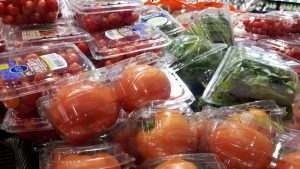- Regulatory Tools
- Circular Economy
- Government
- Government Policy
- Labelling
- Recycling
- Policy
- Strategy and Policy
- Take Action
- National
Newmarket aims to prepare residents for future without single-use plastics
The Town of Newmarket will help residents prepare for a possible future without single-use plastic products as both the federal and provincial governments push ahead with plans for new restrictions that were postponed due to the pandemic.
Although the town is not planning to pass any of its own rules limiting single-use plastic items by individuals or businesses, it is planning a large public education campaign to encourage residents to cut back on them and take steps to limit their use at municipal facilities, as well.
“We are working with the communications department to launch a campaign that will coincide with Plastic Free July,” Amanda Romano, waste program administrator, told council at their meeting on Monday.
“The town’s website and social media channels could be used to provide educational information to the public, and communication platforms could be used to recognize local organizations or businesses that have taken actions to reduce or eliminate single-use plastics from their operations.
“An education campaign could be used to prepare residents for potential regulations being brought forward by the federal and provincial governments.”
Romano noted that the federal government announced in June 2019 that it planned to implement a ban on single-use plastic via the Canadian Environmental Protection Act by this year. Similarly, the Ontario government introduced the Single-Use Plastics Ban Act, which aims to eliminate the distribution and supply of those items by 2025.
Single-use plastic is a significant contributor to littering in Newmarket, with 80 per cent of the items picked up by volunteers during community cleanups being made of plastic.
In a report on single-use plastics that Romano gave to council on Monday, staff did not recommend council pass any of its own rules on single-use plastics for the sake of consistency when federal and provincial rules come into force.
Consistency is badly needed, councillors were told, especially as residents and businesses look for possible alternatives for plastic items.
For instance, many stores in Newmarket and elsewhere have begun using out biodegradable bags, but not everyone is on the same page about what biodegradable means. Most of these new products can’t be composted in York Region’s current green waste program.
“I’m simplifying, but if our compost system at York Region (requires) 30 days to compost… producers are making products that take 90 or 100 days and put ‘compostable’ on it,” said Mayor John Taylor.
“That’s a huge challenge for region staff, and they are providing input on the provincial and federal reviews. But that is going to be a tough one to figure out.”
Some councillors said they would like to go further than just a public education campaign on social media in July. Councillor Grace Simon suggested that the town’s water truck, or “quench buggy,” should go to public events to promote the campaign and that the town could sell branded re-usable water bottles while no longer stocking bottled water in vending machines.
“We will have our water truck on-site to help support everything we are doing as a town,” said Simon.
The municipality itself will be attempting to set a good example not only by stopping the sale of bottled water in vending machines, but also eliminating items such as plastic cutlery, straws, stir sticks, and single-use creamers from town facilities by July.



